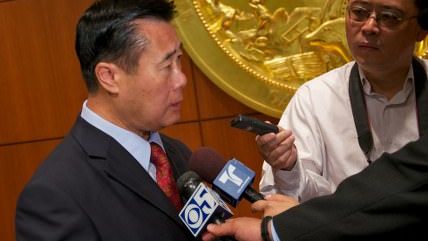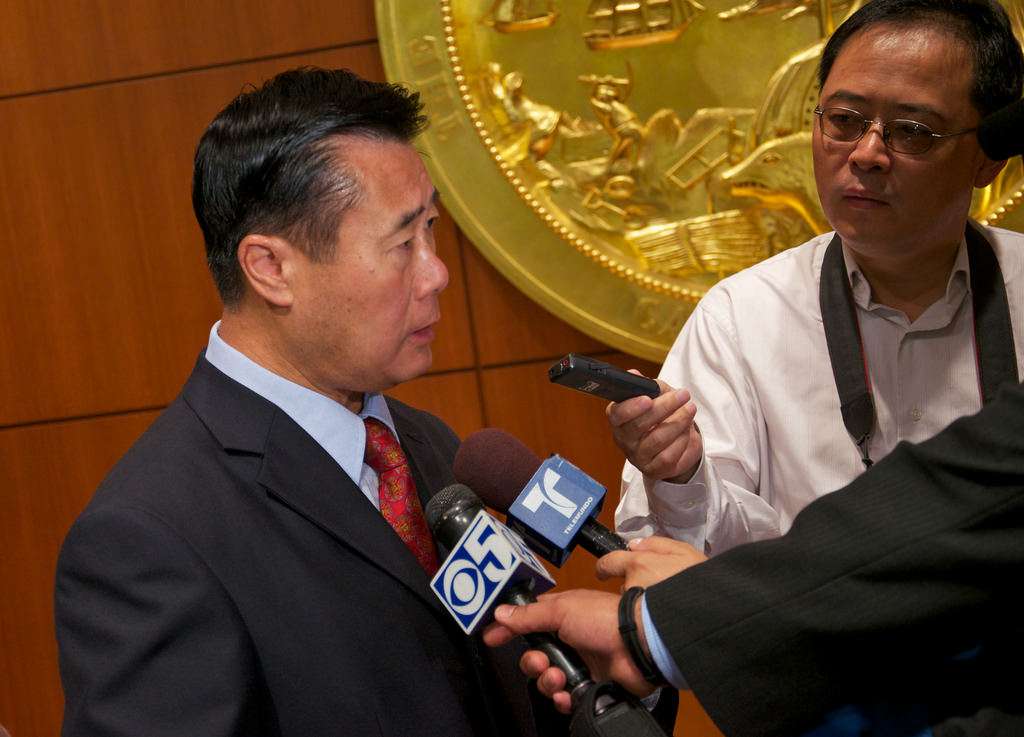Leland Yee's Less Sexy Corruption Just Part of the System
Caught taking money to pass protectionist regulations-how do people think these laws get made in the first place?


When the details of the charges levied against Democratic California State Sen. Leland Yee were released, all eyes zeroed in on the gun-trafficking accusations. It made sense to do so—Yee was a notable advocate for tougher gun control, and yet he stands accused of offering assistance in smuggling guns and heavy weapons from a violent group in the Philippines to the United States. This wasn't just a little bit of hypocrisy, like catching Michelle Obama eating a Big Mac. Yee actually introduced gun control legislation in Sacramento. It was like watching a pack of nuns rob a homeless shelter.
There was more against Yee than the gun charges though. He stands accused of more conventional legislative corruption, charged with taking money in exchange for access or support. Buried at the end of the 137-page FBI report (which led to arrests of 25 others besides Lee in a sting against organized crime in San Francisco) was an undercover effort to snag Yee that doesn't highlight a crime so much as how the sausage of legislation is made, particularly laws that protect crony capitalists.
An FBI agent posed as a person involved in the medical marijuana industry in Arizona. He had meetings with Yee (and a consultant accused of assisting in the laundering of donations to Yee), claiming he wanted to become a major player in the medical marijuana community in California—the "Anheuser-Busch" of medical marijuana, in fact. To do so, he wanted to get legislation passed in California that would make it harder for competition to exist. He was willing to give Yee money for his campaign for secretary of state in order to push for a law requiring medical marijuana dispensaries to have a doctor on staff. The report noted the agent telling Yee "If state legislation set high barriers for entry, such as requiring a medical doctor on staff, that would make it more difficult for small operators to open a business."
The details of conversations between Yee, Keith Jackson (the consultant) and the undercover FBI operatives about medical marijuana legislation take up the final 13 pages of the report. Yee accepted a little over $20,000 in donations in an odd dance where Yee repeatedly worried about pay-to-play accusations, pushing the agent away from giving him money directly, yet also complained about the guy not giving the campaign enough money. If anything, reading 13 pages of these carefully laundered arrangements highlights the absurdity of the way speech is censored when it intersects with campaigning, Yee reminding at one point that donations cannot be linked to any "items, bills or amendments."
But, of course, the idea that businesses (and often individuals) give money to help political campaigns entirely because they support the candidate and not because the candidate will implement policies that favor said businesses (and individuals) is silly nonsense and everybody knows it. In every city, in every state, and in the federal government, there are thousands upon thousands of laws and regulations designed to do exactly what our pretend medical marijuana dispensary owner asked—control who may engage in trade legally and under which terms.
Are we expected to believe that Utah regulators just decided on their own that people must spend huge amounts of time and money getting a license to braid hair? Does anybody at all actually believe that state and municipal efforts to block ride-sharing services like Uber and Lyft have anything to do with safety and absolutely nothing to protect entrenched taxi company interests? Does anybody believe it's just a coincidence that the renewable energy companies that spent the most money lobbying the Department of Energy got the most loans?
Of course everybody knows this, but some people seem to draw the wrong conclusion. At the Los Angeles Times, editorial cartoonist David Horsey attempts to pivot Lee's corruption to a complaint about "dark money" (with all his examples coming from the right and the Koch brothers, of course—no mention of California's powerful unions). He argues:
Apparently, they would rather voters not know that those nice-sounding, "pro-liberty" nonprofits are really a front for absurdly rich businessmen who want to kill healthcare expansion, environmental protection, fair-wage campaigns and workers' rights.
And nobody has gotten rich off being on the other side of any of these issues, right? The "healthcare expansion" wasn't essentially written by insurance companies or anything like that. Environmental protection laws aren't used by unions to intimidate developers into expensive labor agreements in order to avoid messy, expensive lawsuits based off minute details of environmental impact reports. "Fair wage" campaigns aren't used exactly the same way the legislation proposed by the FBI agent in Yee's case would have been—to make it harder for small businesses to operate legally. Horsey deliberately sees only the outcomes of government regulations that he wants to see—no unintended (or secret) consequences here!
Horsey has the problem exactly backward. It's not the power of rich people corrupting the government. The government is corrupt exactly because it's so powerful. The ability of the state to control commerce, to make exorbitant demands upon people attempting to engage in business, the ability to shut businesses down and even threaten people with jail creates the environment—even the incentive—for the rich and powerful to bend government regulations into their favor. If they don't, then somebody else will, and may well use the power of the state to try to put them out of business. When the rich go to war in America, government bureaucrats serve as their foot soldiers. Uber doesn't have the option not to lobby various governments for regulatory relief. The alternative is to go out of business, because of the government.
A person cannot credibly argue against the influence of money in government without acknowledging the problem of the power of government. It is not a coincidence that spending on influencing the outcome of elections has increased as the government grows more and more powerful. It is a direct relationship. It's the economics of government. You can't get the money out of government until you get the power out of government.
Editor's Note: As of February 29, 2024, commenting privileges on reason.com posts are limited to Reason Plus subscribers. Past commenters are grandfathered in for a temporary period. Subscribe here to preserve your ability to comment. Your Reason Plus subscription also gives you an ad-free version of reason.com, along with full access to the digital edition and archives of Reason magazine. We request that comments be civil and on-topic. We do not moderate or assume any responsibility for comments, which are owned by the readers who post them. Comments do not represent the views of reason.com or Reason Foundation. We reserve the right to delete any comment and ban commenters for any reason at any time. Comments may only be edited within 5 minutes of posting. Report abuses.
Please to post comments


Responding to the blurb - "Business as usual" IS any kind of corruption.
Nice band name.
Does not compute.
/every politician ever
"a violent group in the Philippines"
Go on, say its name! Or its acronym!
"It was like watching a pack of nuns rob a homeless shelter."
I'd play that video game.
Silly Scott, it's OK to take bribes if you don't call them that, and they don't go directly into your pocket, but are instead used to get you elected or reelected and thus line your pockets with salary stolen from the tax slaves.
It's not OK to take the bribes directly, because mumble mumble corruption somehow mumble.
Basically, the campaign finance laws punish politicians too stupid or arrogant to correctly launder the bribes so they are perceived as "legitimate".
If you don't want corrupt politicians, don't give them any power over our lives.
Paging sarcasmic. Sarcasmic please pick up the courtesy text box.
"You can't get the money out of government until you get the power out of government."
But the would be Rulers don't WANT to get the money out of government, they want to get OTHER PEOPLE'S money out of government. They deeply, DEEPLY resent the delusion that we peasants suffer that we have the same rights that they do.
They are the same as the Social Darwinists, as the Planters, as the Old Aristocracy, as the Caesars.
Guillotine bait.
Amen, brother.
It's astonishing how few people understand this concept.
They'll happily tell you "money is power", but then somehow balk at "power is money".
If you reduce the amount of power available to our elected representatives, you simultaneously reduce the potential impact of would-be oligarchs. It's really very simple, and yet ... the power, it beckons!
Sigh.
my roomate's mom makes $79 /hour on the laptop . She has been out of work for five months but last month her paycheck was $19158 just working on the laptop for a few hours. have a peek at this website.........
http://www.workbarr.com